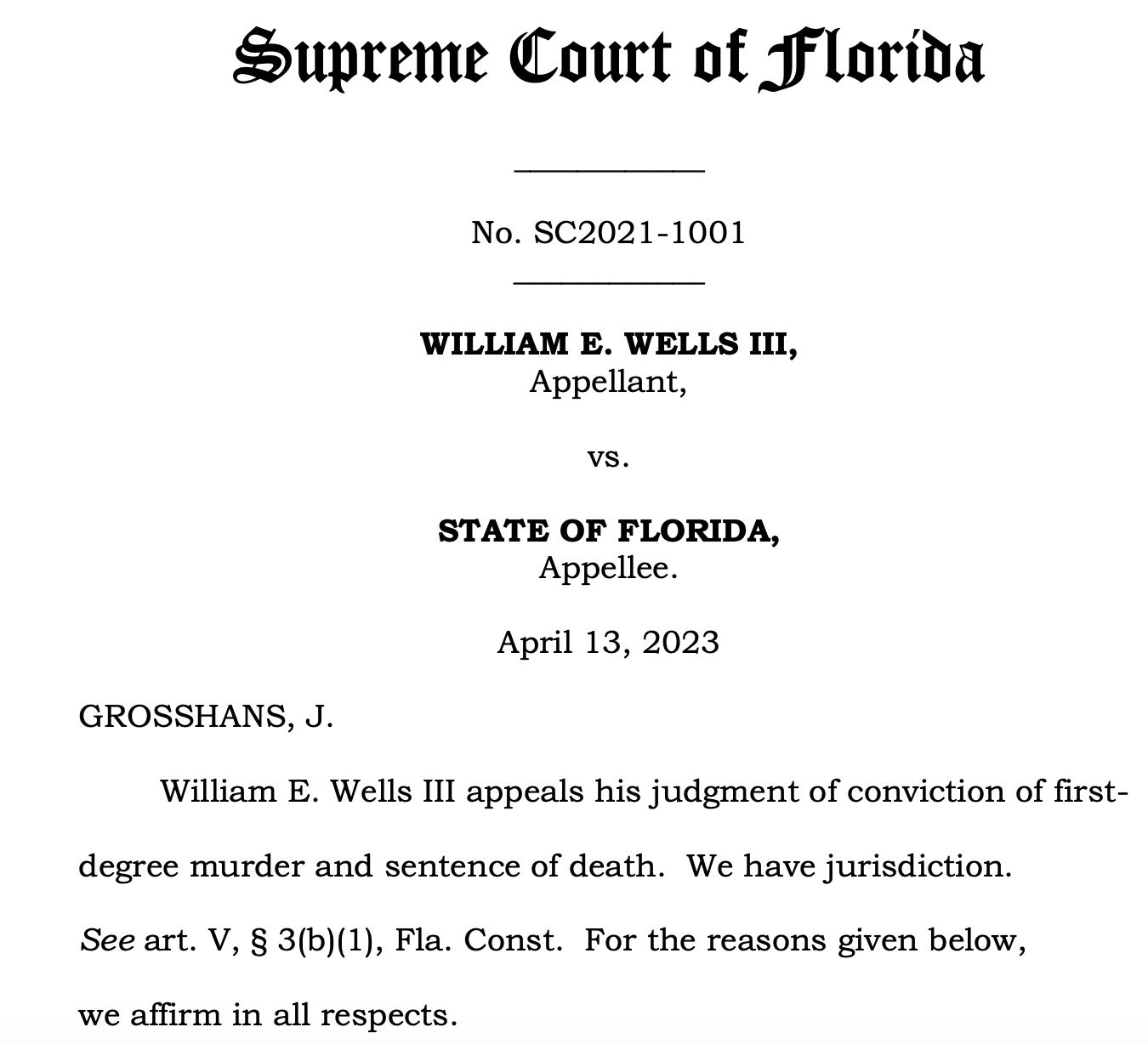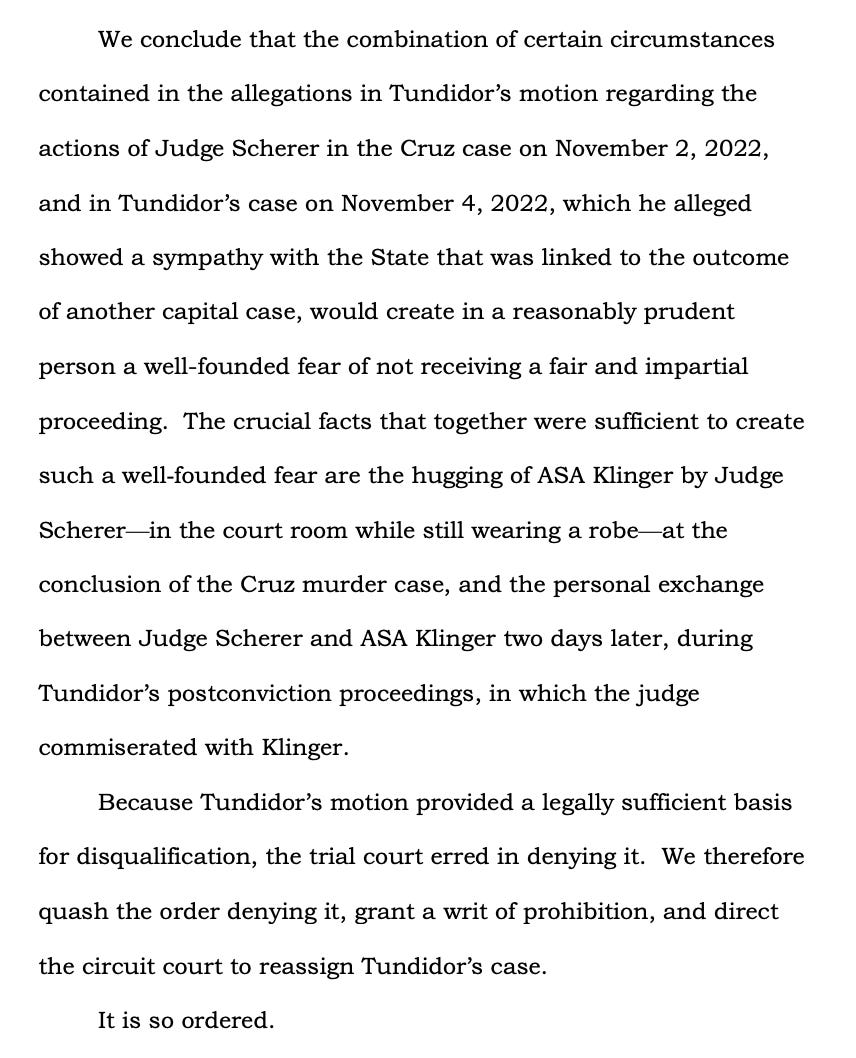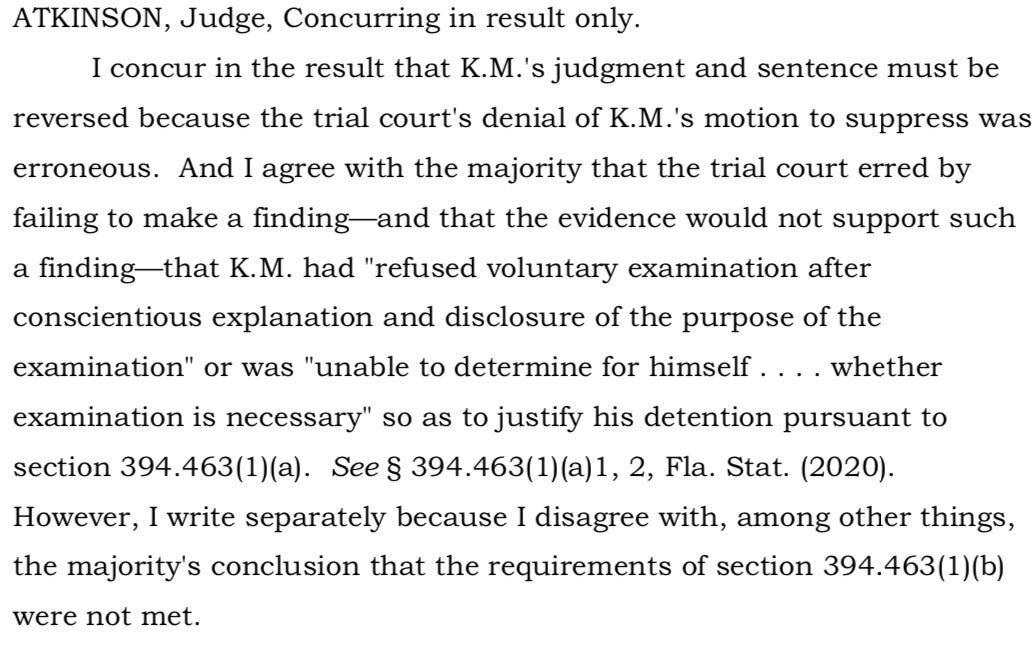Our temporary pause from the death penalty is over. In Louis Gaskin’s case on Tuesday, the U.S. Supreme Court declined to stay the execution and denied certiorari. That paved the way for his execution Wednesday at 6 p.m. Gaskin died by 6:15. This Flagler Live article has reporting from outside Florida State Prison and has quotes from one of the witnesses.
On Thursday, the Florida Supreme Court had two death penalty cases. Justice Grosshans wrote the majority opinion in Wells v. State, a case involving a brutal prison murder. Justice Labarga concurred in the result, citing his continued objection to the court’s abandonment of “comparative proportionality” analysis in death penalty cases.
That Justice Grosshans authored the opinion appears to be part of a new phenomenon. Normally, death penalty cases are authored Per Curiam (by the court). We went back and found two other instances where a death penalty case was authored by a justice. Justice Couriel authored two opinions in September 2022,1 Mosley and Gordon. Every other death penalty case since the beginning of 2021 has Per Curiam authorship.
The other death penalty case was at the court on a petition for a writ of prohibition. Randy Tundidor’s case was before Judge Elizabeth Scherer, the judge who presided over the Nikolas Cruz trial. Tundidor filed a motion to disqualify Judge Scherer, alleging that her “hugging the Assistant State Attorney prosecuting Mr. Tundidor, and then commiserating with that same prosecutor at a hearing in Mr. Tundidor’s case, shows that she shares a special relationship with the prosecutor and bias in favor of the State.” The Florida Supreme Court held that the motion to disqualify was legally sufficient, and under the rules, needed to be granted. The court emphasized that “[t]he law does not require Tundidor to show that Judge Scherer is actually biased or unable to be impartial” to satisfy the disqualification rule.
The DCAs were busy last week. We had three dissents and several concurring opinions around the state.
Six too few?
There were three cases in which a defendant attacked the constitutionality of a 6-member jury in non-capital cases. The First DCA had two such opinions, one in which the court held the argument wasn’t preserved and the other was in a postconviction motion alleging ineffective assistance of trial counsel for failing to object to the 6-member panel. The Fourth DCA also fielded this argument and rejected it “without discussion.”
Dissent in the districts!
Judge Kelsey at the First DCA dissented in a violation of probation case. Judge Nordby, writing for the majority, held that the state failed to prove a willful failure to undergo a mental health evaluation (one of the conditions of probation), so the majority sent the case back for reinstatement of probation. Judge Kelsey saw plenty of evidence in the record that supported the trial court’s finding, and would have affirmed under the tipsy coachman doctrine because there was evidence of violation of other conditions of probation.
Judge Ciklin dissented in a divorce case in which the couple fought over the radio stations that they owned during the marriage. The majority, authored by Judge Kuntz, remanded to the trial court for an amended decree conditioning the transfer of radio station assets on compliance with federal law on the subject. Judge Ciklin would’ve affirmed without remand, noting that there was no transcript of the proceedings and no error existed on the face of the final judgment. Ciklin also pointed out that the former wife “failed and refused to answer most questions” and that the trial court didn’t find her testimony to be credible.
And at the Fifth DCA, Judge Harris wrote a partial dissent in a case involving the termination of an anthropology instructor at Lake-Sumter State College. Judge Makar wrote the majority opinion upholding the termination “for cause.” The college eliminated the anthropology curriculum because of low demand from students and the question was whether this satisfied “for cause” under the relevant administrative code provisions when all parties agree the instructor “performed commendably in his academic life.” Judge Harris would’ve found that the contract termination was not justified under under the circumstances (“[t]he reality is that Dr. Walton’s contract was unilaterally terminated by the College’s president well before the Board made any decision regarding program discontinuance”), and would have ordered the college to reinstate the instructor.
Sunburn
Judge Ciklin had a special concurring opinion in two Sunshine Law cases, in which members of a city council were charged and convicted of violating the Sunshine Law when they held a meeting after the scheduled meeting was supposed to have been canceled, and then voted to terminate the city manager (here and here). Two city council members were tried together and found guilty of the Sunshine violations and perjury. The court reversed the perjury convictions in both cases. And Judge Ciklin wrote separately “to issue a clarion call to the hundreds of Florida public officials who are subject to the Florida Sunshine Law.” Ciklin includes seven “very easy takeaways from the current state of the Florida Sunshine Law,” which are worth the read for any local government lawyer prepping for the next public meeting.
As Ciklin observed, “[t]hese recent Indian River County Sunshine Law prosecutions and convictions illustrate actual examples of popularly elected local governing body officials being ordered to do real jail time in a real Florida county jail for the commission of a real Florida crime.”
Three in one
The First DCA had a sovereign immunity case that drew opinions from each member of the panel, Judges M.K Thomas (majority), Long (concurring), and Rowe (concurring in result).
Full court press
The Fourth DCA had an en banc opinion (all judges participated, not just a panel of three) in which it overturned prior caselaw, clarifying that “pre-judgment contempt orders are appealable nonfinal orders only if the ordered sanction falls within the subsections of Florida Rule of Appellate Procedure 9.130(a)(3).” So in this case, they treated the notice of appeal as a petition for certiorari because the order on appeal only found the appellant in contempt. The court ordered the appellant to file a petition and appendix.
Leave the car; take the cannolis
The Third DCA had a mafia case. A former undercover FBI agent was charged with murder. The case goes back to the Whitey Bulger era. The former FBI agent raised Brady claims in his motion for postconviction relief and is represented by the Miami Law Innocence Clinic.
Is that really what you mean?
Judge Kelsey authored an opinion certifying a question to the Florida Supreme Court asking if a rule of family law procedure really means there is “no limit” to seeking relief from judgment based on fraud in a financial affidavit.
[Over]protective custody
The Second DCA had a Baker Act case in which Judge Atkinson concurred in the result only. The issue was whether the officers could’ve reached an objectively reasonable conclusion that there was a substantial likelihood of self harm based on a text message. The majority held that “[t]here was no basis to take K.M. into protective custody pursuant to the Baker Act, and K.M. was detained and searched in violation of his Fourth Amendment rights.” Judge Atkinson mostly agreed:
Be very afraid
And the opening two sentences of an Eleventh Circuit opinion made us laugh in the midst of an otherwise heavy week.
Barwick
Finally, we are again watching the Florida Supreme Court in a death warrant case. The circuit court in Bay County denied Darryl Barwick’s motion for postconviction relief. The notice of appeal was filed on Friday. His execution is scheduled for May 3, 2023.2
Corrected. The original version said “September 2021.”
Corrected. The original version said “May 5, 2023.”







